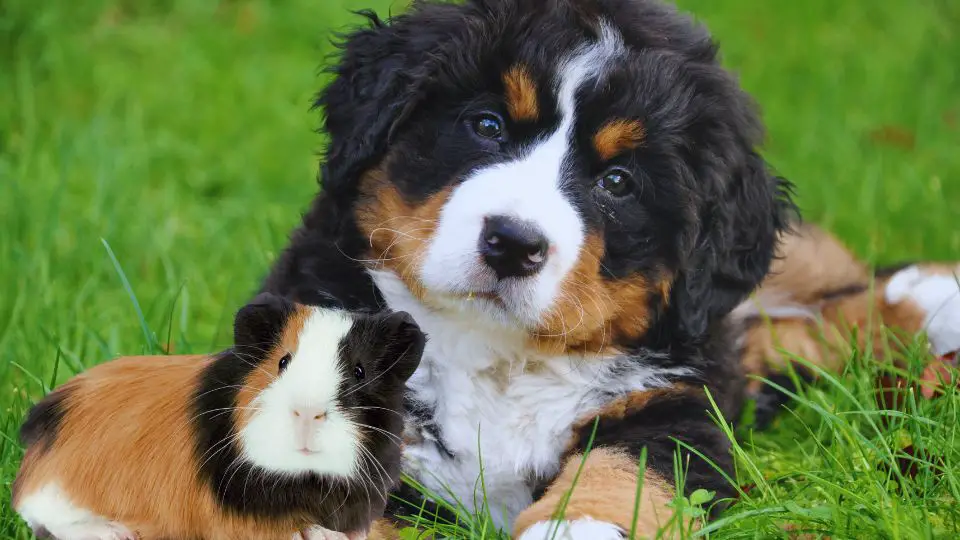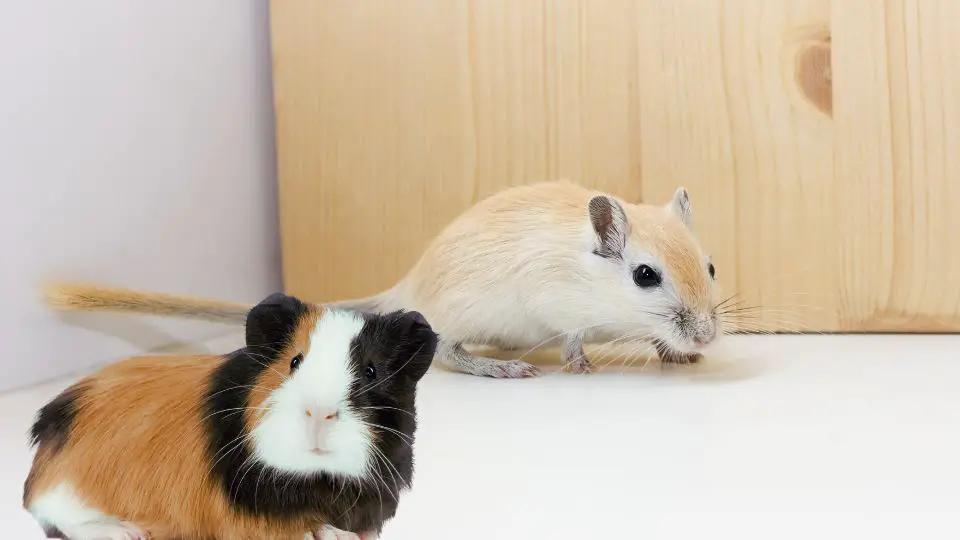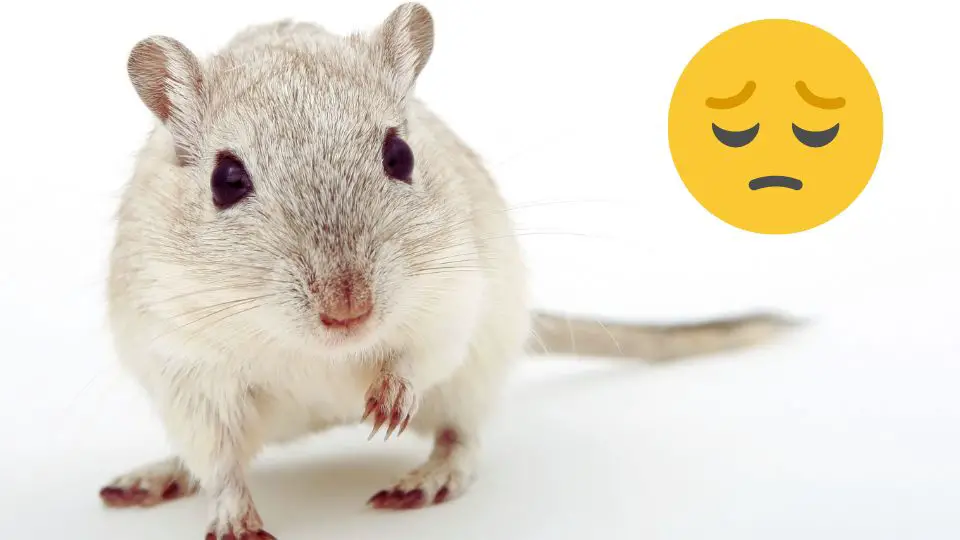Losing a beloved pet can be a difficult and emotional experience, and the death of a gerbil is no exception. When one gerbil dies, it can be a traumatic event for both the owner and the remaining gerbils.
It’s important to understand the steps that need to be taken in order to properly care for the remaining gerbils and help them cope with the loss of their companion. From removing the deceased gerbil from the cage to introducing a new gerbil, there are many things to consider when dealing with the death of a gerbil.
In this article, we’ll look at what to do when one gerbil dies and how to help the remaining gerbils cope with their loss.
What to do when one gerbil dies
As your gerbil ages or becomes ill, it may eventually pass away. When this happens, it is important to remove the deceased gerbil from the cage as soon as possible to prevent the other gerbils from eating it. In the wild, gerbils are known to practice necrophagia, or the consumption of dead individuals of their own species. This is a natural behavior that may occur in captive gerbils as well.
Not only it is a terrible sight for the owner but also it can lead to health issues for the remaining gerbils if they consume the deceased gerbil which could be infected with parasites or diseases.
Also, it’s important to sanitize the cage after the removal of the deceased gerbil to prevent the spread of any potential diseases.
After that, there are some other things you can do which we will detail below:
- Understand the cause of death
- Monitor the remaining gerbils
- Consider introducing a new gerbil
- Provide adequate socialization and mental stimulation
- Take care of yourself
Understanding the death of a gerbil
Losing a pet can be a difficult and emotional experience, and for gerbil owners, understanding the death of a gerbil is important for proper care and grief management. Gerbils are small and hardy animals, but they are still susceptible to a variety of health issues that can lead to death.
It’s important to understand the cause of death in order to prevent any future incidents. If the death was due to an illness or injury, make sure to take steps to prevent it from happening again. If the death was due to old age, you may need to be prepared for the eventual loss of the other gerbils as well.
Here are some common causes of gerbil death:
- Old age: Gerbils have a lifespan of around 2-4 years, and as they age, they can develop age-related health issues such as tumors, organ failure, and neurological disorders.
- Disease or illness: Gerbils can contract a variety of diseases or illnesses, such as respiratory infections, tumors, and dental problems. These can be caused by poor nutrition, poor sanitation, or exposure to other sick animals.
- Accidents or injuries: Gerbils can be injured in a variety of ways, such as by falling, getting caught in cage bars, or being stepped on. These injuries can be fatal if not treated promptly.
- Genetic disorders: Some gerbils may be born with genetic disorders that can shorten their lifespan or make them more susceptible to certain health issues.
- Parasites: Gerbils can be affected by internal or external parasites, such as mites, ticks, or worms, which can cause serious health problems and even death if left untreated.
- Stress: Gerbils are sensitive to stress, and chronic stress can lead to a variety of health issues, including weight loss, poor coat condition, and even death.
- Poor diet and nutrition: Gerbils require a balanced diet that includes a variety of foods to provide them with all the necessary nutrients. A diet lacking in vitamins and minerals can lead to health issues such as anemia and other nutrient deficiencies, which can be fatal if not treated.
Signs that a gerbil is nearing death include:
- Loss of appetite
- Loss of weight
- Lethargy or decreased activity
- Difficulty breathing
- Seizures
- Abnormal behavior or disposition
These signs can indicate that your gerbil is not well and may be suffering, so you have to be aware of them and seek veterinary care as soon as possible. Remember that some gerbils may hide their symptoms of illness, so you should be observant of your gerbil’s behavior and appearance, and to consult with a veterinarian if you notice any changes. There are several reasons why you should contact a vet:
- Early detection and treatment of illness or injury can improve the chances of survival.
- A veterinarian can provide a proper diagnosis and recommend treatment options. This can help prolong your gerbil’s life and improve their quality of life.
- A veterinarian can also help you prepare for the end of life care for your gerbil. This can include providing pain management, determining when it’s time to let go and how to do it humanely.
Dealing with the loss
It’s normal to be attached to a small pet like a gerbil, and the grieving process can take some time. Remember that grief is a natural response and it is okay to experience it. People can express their grief in different ways, and it is important to be sensitive and understanding of others who may be grieving the loss of their pet.
Losing a gerbil can be an emotionally taxing experience, and some people, especially children, may need help and support to cope with the situation. If you lost your little pet and feel overwhelmed, remember to take the time to properly process your grief and take care of yourself during this time and make sure to get enough rest, eat well, and exercise. It’s always a good idea to take some time for yourself.
The process of coping with the loss of any pet can be long and difficult, but there are many resources available to help. Taking the time to properly grieve and honor your pet’s life will ensure that you can move forward in a healthy and positive way.
Remember, the most important thing is to take care of yourself and seek help when needed. Don’t be afraid to reach out for support during this difficult time. You don’t have to go through it alone.
Caring for the remaining gerbils
Losing a gerbil can be a tough time for both you and your remaining gerbils. It’s important to take extra special care of your remaining gerbils during this time, as they may be experiencing stress and loss too.
Make sure to keep an eye on your remaining gerbils for any signs of stress or illness. Sometimes, the loss of a companion can cause stress and lead to other health issues. Keep an eye out for things like changes in appetite or activity levels, or any unusual behavior. If you notice anything out of the ordinary, don’t hesitate to reach out to your vet for advice.
Another thing to consider is introducing a new gerbil to your existing gerbil(s). It can be a great idea to give your remaining gerbils a new friend to bond with, but you’ll want to do it in a way that’s safe and stress-free for everyone involved. A good tip is to introduce the new gerbil in a neutral territory, such as a neutral cage or playpen. This way, both gerbils can get to know each other without feeling territorial.
Don’t forget about providing adequate socialization and mental stimulation for your gerbils. Gerbils are social animals and thrive on interaction and playtime. Make sure to spend quality time with your gerbils, playing with them and providing them with plenty of toys and activities to keep them mentally stimulated.
Conclusion
Losing a gerbil can be difficult for anyone, but it’s important to remember that the grieving process is natural and you should take the time to properly honor your pet’s life.
Taking care of yourself during this time is essential, but don’t forget about caring for your remaining gerbils as well. Make sure to keep an eye on them for any signs of stress or illness, and consider introducing a new gerbil if appropriate.
Finally, don’t forget to provide adequate socialization and mental stimulation for your gerbils so they can stay healthy and happy. Going through this tough time with patience and understanding can help make it easier to cope with the loss of your beloved pet.







